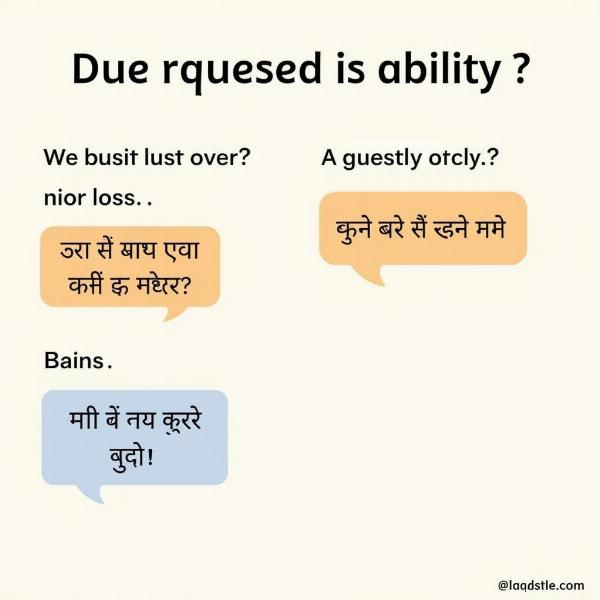Understanding the nuances of “not able” in Hindi can be tricky. This guide explores various ways to express inability in Hindi, covering formal and informal contexts, grammatical structures, and cultural implications. We’ll delve into synonyms, related phrases, and examples to help you confidently convey the meaning of “not able” in different situations.
Different Ways to Say “Not Able” in Hindi
Several Hindi words and phrases effectively translate “not able.” The best choice depends on the specific context and the level of formality required. Let’s explore some common options:
-
नहीं कर सकता/सकती (nahīn kar saktā/saktī): This is the most common and versatile way to say “not able.” The verb “kar” (कर) means “to do,” and “saktā/saktī” (सकता/सकती) denotes ability. The ending changes based on the gender and number of the subject. For example, a male would say “main nahīn kar saktā” (मैं नहीं कर सकता – I am not able), while a female would say “main nahīn kar saktī” (मैं नहीं कर सकती – I am not able).
-
असमर्थ (asamarth): This word translates to “incapable” or “unable” and is more formal than “nahīn kar saktā.” You might use it in official documents or when speaking to someone in a position of authority.
-
अक्षम (aksham): Similar to “asamarth,” “aksham” implies a lack of capability or competence. It carries a slightly stronger connotation of deficiency.
-
सक्षम नहीं (saksham nahīn): This phrase directly translates to “not capable” and is another formal option.
Grammatical Considerations and Sentence Structures
Using these phrases correctly involves understanding Hindi grammar. The verb ending changes based on gender, number, and tense. For example, “woh nahīn kar sakte” (वह नहीं कर सकते – they are not able – masculine plural) or “woh nahīn kar saktī hain” (वह नहीं कर सकती हैं – they are not able – feminine plural).
Cultural Nuances and Politeness
In Indian culture, politeness plays a significant role. When expressing inability, adding words like “maf kijiye” (माफ़ कीजिए – please excuse me) or “kshamin kijiye” (क्षमा कीजिए – please forgive me) can soften the tone.
Common Questions Related to “Not Able” in Hindi
How do I say “I am not able to come” in Hindi?
You can say “main nahīn aa saktā/saktī” (मैं नहीं आ सकता/सकती). This uses the verb “aa” (आ) which means “to come.”
Is there a difference between “asamarth” and “aksham”?
While both mean “unable,” “aksham” suggests a more permanent or inherent lack of ability.
What’s the most polite way to decline a request due to inability?
Using “maf kijiye” (माफ़ कीजिए) or “kshamin kijiye” (क्षमा कीजिए) before stating your inability is a polite way to decline.
 Polite Hindi Refusal
Polite Hindi Refusal
Example Sentences
- मैं आज काम पर नहीं आ सकता (Main aaj kaam par nahīn aa saktā): I am not able to come to work today (masculine).
- वह गाड़ी नहीं चला सकती (Wah gaadi nahīn chala saktī): She is not able to drive.
- हम यह काम पूरा नहीं कर सकते (Hum yah kaam pura nahīn kar sakte): We are not able to complete this task (masculine plural).
Conclusion: Mastering “Not Able” in Hindi
Understanding the various ways to express inability in Hindi empowers you to communicate effectively in different situations. Choosing the right word or phrase, considering the context and cultural nuances, ensures clear and respectful communication. This knowledge will enhance your Hindi language skills and improve your interactions in various social and professional settings.
FAQ:
- What is the literal translation of “not able” in Hindi? The most literal translation would be “nahīn kar saktā/saktī” (नहीं कर सकता/सकती).
- Can I use “nahīn kar saktā” in formal situations? While acceptable, more formal options like “asamarth” (असमर्थ) might be preferred.
- How do I say “I’m not able to understand” in Hindi? You can say “Main samajh nahīn paa rahā/rahī hūn” (मैं समझ नहीं पा रहा/रही हूँ).
- What are some other ways to express difficulty besides “not able”? You could use phrases like “mushkil hai” (मुश्किल है – it’s difficult) or “kathin hai” (कठिन है – it’s hard).
- Is it impolite to directly say “nahīn kar saktā”? Not necessarily, but adding polite phrases can soften the tone.
- How do I express inability due to physical limitations? You can use phrases that specifically refer to the limitation, for example, “main chal nahīn saktā” (मैं चल नहीं सकता – I cannot walk).
- Where can I learn more about Hindi grammar? Many online resources and textbooks offer comprehensive Hindi grammar lessons.
Liên kết Nội bộ: i am not able meaning in hindi, call forwarding when not reachable meaning in hindi, be valuable not available meaning in hindi, not readable meaning in hindi
Meaning-Hindi.in is your one-stop solution for professional Hindi translation services. We specialize in various domains, including business, legal, technical, website localization, educational, and urgent translations. Our expert team ensures accurate and culturally sensitive translations, catering to diverse client needs. Need a document translated? Contact us at [email protected] or call us at +91 11-4502-7584. Meaning-Hindi.in is dedicated to bridging the language gap and facilitating seamless communication.